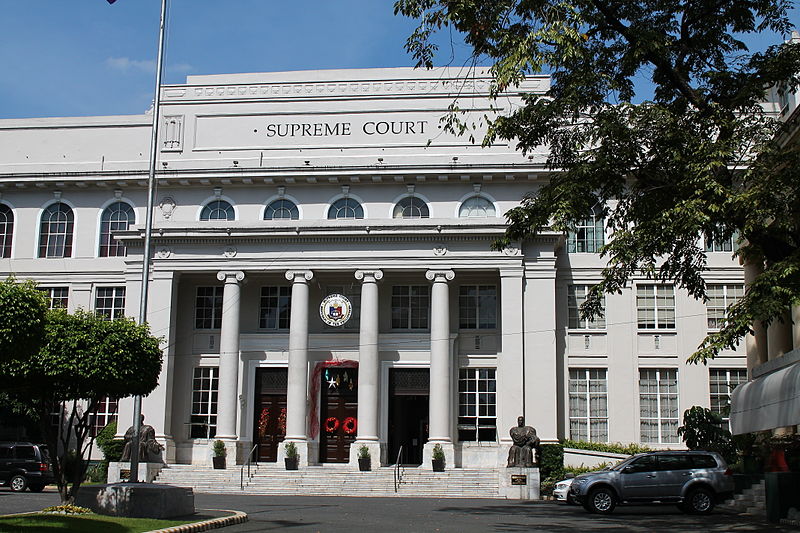News
SC sets rules for oral arguments on ICC withdrawal

The oral arguments will tackle the petition filed by opposition Senators Francis “Kiko” Pangilinan, Franklin Drilon, Paolo Benigno “Bam” Aquino, Risa Hontiveros, Antonio Trillanes IV and detained Senator Leila de Lima g (Photo By Aerous – Own work, CC BY-SA 3.0)
MANILA — The Supreme Court (SC) has issued guidelines on the oral arguments on the consolidated petitions seeking to void the Philippine government’s withdrawal from the Rome Statute of the International Criminal Court (ICC) scheduled on August 14.
In an advisory issued Thursday, the SC has limited the oral arguments to four major issues:
-Whether or not it should take cognizance of the petitions;
-Whether or not the withdrawal from the ICC’s Rome Statute through a “note verbale” delivered to the Secretary General of the United Nations (UN) is “valid, binding and effectual”;
-Whether or not the withdrawal places the Philippines in breach of its obligations under international law and;
-Whether or not it will diminish the Filipino people’s protection under international law.
The oral arguments will tackle the petition filed by opposition Senators Francis “Kiko” Pangilinan, Franklin Drilon, Paolo Benigno “Bam” Aquino, Risa Hontiveros, Antonio Trillanes IV and detained Senator Leila de Lima who filed for certiorari and mandamus and said that under Article VII Section 21 of the 1987 Constitution, “entering into treaty or international agreement requires participation of Congress, that is, through concurrence of at least 2/3 of all the members of the Senate.”
The second petition was filed by the Philippine Coalition for the International Criminal Court (PCICC) led by former Commission on Human Rights chairperson Loretta Ann Rosales.
Named respondents in the petition were Foreign Affairs Secretary Alan Peter Cayetano, Executive Secretary Salvador Medialdea, Philippine Ambassador to the UN Teodoro Locsin Jr., and Chief Presidential Legal Counsel Salvador Panelo.
The respondents will be represented by the Office of the Solicitor General (OSG).
Meanwhile, the opposition senators asked the High Court to allow detained Senator De Lima to argue on their behalf.
In a three-page manifestation, the senators pointed out that it has been a practice of the High Tribunal to allow members of Congress to appear before it and argue cases that they file in their capacity as senators or representatives, who are real parties-in-interest.
“The undersigned manifesting senators, in the course of their preparations for this case and in compliance with this Honorable Court’s directive for the respective parties or their counsels to attend the oral arguments for this case as scheduled, are of the strong conviction that the arguments for the case of all the petitioners will be best presented before this Honorable Court by their colleague, Senator de Lima,” read the manifestation was signed by opposition senators dated July 24, 2018
The opposition senators pointed out that the issues raised in their petitions are of “transcendental importance”, thus, the detained senator should be allowed to personally argue the case during the oral arguments.
They also told the Court that they will no longer be represented by counsel during the oral arguments as they have decided to adopt in whole the arguments and positions that De Lima would raise.
De Lima is currently detained at the Philippine National Police (PNP) Custodial Center pending resolution of the illegal drug charges filed against him before the court.
The senator is accused of benefitting from the illegal drug trade inside the New Bilibid Prisons (NBP) in Muntinlupa during her term as justice secretary.
In their petition, the lawmakers also asked the high court to compel the Department of Foreign Affairs (DFA) and the Philippine Permanent Mission to the United Nations to notify the United Nations Secretary General that the Philippines is revoking the notice of withdrawal that it received last March 17.
The diplomatic note stated that the “decision to withdraw is the Philippines’ principled stand against those who politicize and weaponize human rights, even as its independent and well-functioning organs and agencies continue to exercise jurisdiction over complaints, issues, problems and concerns arising from its efforts to protect the people.”
The petitioners said the Rome Statute is a treaty validly entered into by the Philippines that has the same status as a law enacted by Congress.
On March 14, President Rodrigo Duterte announced the Philippines’ withdrawal of its ratification of the Rome Statute, a United Nations (UN) treaty creating the ICC.
In the statement, Duterte cited “baseless, unprecedented and outrageous attacks” against him and his administration as the reason for his withdrawal as a state party.
This came after ICC special prosecutor Fatou Bensouda began a preliminary examination on the alleged human rights violations amid the Duterte administration’s intensified war on drugs.





















